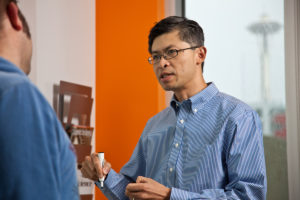Institute for Systems Biology’s Dr. Sui Huang Wins Grand Challenge Funding from Cancer Research UK to Tackle Cancer’s Biggest Questions
 isbscience.org/news/2019/01/22/isbs-dr-sui-huang-earns-funding-to-tackle-cancers-biggest-questions/
isbscience.org/news/2019/01/22/isbs-dr-sui-huang-earns-funding-to-tackle-cancers-biggest-questions/FOR IMMEDIATE RELEASE

Dr. Sui Huang
SEATTLE, Jan. 22, 2019 — Institute for Systems Biology’s Professor Sui Huang, MD, PhD, has been announced by Cancer Research UK as a member of a global research team funded through its Grand Challenge competition — an international funding initiative that aims to answer some of the biggest questions facing cancer research.
Grand Challenge brings together the brightest scientists from around the world and from different disciplines to find solutions to cancer’s toughest challenges and save more lives. It’s open to all scientists to bring innovative, international, and collaborative approaches to research.
This pioneering team has been awarded about $25 million to uncover how chronic inflammation causes cancer.
Inflammation is part of the body’s immune response. Chemicals released by white blood cells help protect our body from damaged cells, foreign substances or infections. Chronic inflammation can be caused by several factors such as viral and bacterial infections (including colitis), being overweight or lack of exercise, which can lead to more diseases such as cancer. It is suggested that up to 1 in 4 cancers globally are linked to inflammation.
 This Grand Challenge project aims to find novel ways of treating cancers associated with inflammation and develop new options to prevent cancer developing in high-risk patients with chronic inflammatory diseases.
This Grand Challenge project aims to find novel ways of treating cancers associated with inflammation and develop new options to prevent cancer developing in high-risk patients with chronic inflammatory diseases.
Recent work shows that the cells surrounding cancers can control whether or not the cancer grows or disappears. The aim is to determine whether it’s possible to treat the inflamed cells and non-cancerous stromal cells (those cells immediately surrounding cancer cells) rather than treating the cancer cells directly.
“Given the important role of inflammation as a cause of cancer, we need to evaluate whether the inflamed tissue surrounding a tumor offers new lever points to collapse the tumor-cell community,” said Huang.
This project will be led by Professor Thea Tlsty at the University of California, San Francisco, with collaborators from the U.S., Canada, the UK and Israel. The team will now join a growing community of Grand Challenge researchers, which first launched in 2015 and already includes four international teams announced in 2017.
Edward Harlow, PhD, member of the Grand Challenge advisory panel and Professor of cancer education and research at Harvard Medical School, said: “I’m not aware of any funding opportunities anywhere in the world that can begin to integrate this many international cancer experts on projects of such clear importance. These teams have been brought together to tackle many of the biggest challenges we currently face in cancer research. We can see from the progress already achieved how powerful it is to support collaborations of this scale.”
Iain Foulkes, PhD, Cancer Research UK’s executive director of research and innovation, said: “Individually, these research teams are among the best in the world in their respective fields. By bringing them together across borders, Grand Challenge is enabling these teams to think bigger and establish new and exciting collaborations. The scale of the funding reflects the opportunity we see in harnessing their ability to understand and tackle cancer.”
###
About Cancer Research UK
- Cancer Research UK is the world’s leading cancer charity dedicated to saving lives through research.
- Cancer Research UK’s pioneering work into the prevention, diagnosis and treatment of cancer has helped save millions of lives.
- Cancer Research UK receives no funding from the UK government for its life-saving research. Every step it makes towards beating cancer relies on vital donations from the public.
- Cancer Research UK has been at the heart of the progress that has already seen survival in the UK double in the last 40 years.
- Today, 2 in 4 people survive their cancer for at least 10 years. Cancer Research UK’s ambition is to accelerate progress so that by 2034, 3 in 4 people will survive their cancer for at least 10 years.
- Cancer Research UK supports research into all aspects of cancer through the work of over 4,000 scientists, doctors and nurses.
- Together with its partners and supporters, Cancer Research UK’s vision is to bring forward the day when all cancers are cured.
- For further information about Cancer Research UK’s work or to find out how to support the charity, please call 0300 123 1022 or visit www.cancerresearchuk.org. Follow us on Twitter and Facebook.
About the Institute for Systems Biology
Institute for Systems Biology is a non-profit biomedical research organization based in Seattle. ISB serves as the ultimate environment where scientific collaboration stretches across disciplines and across academic and industrial organizations, where our researchers have the intellectual freedom to challenge the status quo, and where grand visions for breakthroughs in human health inspire a collective drive to achieve the seemingly impossible. Our core values ensure that we always keep our focus on the big ideas that will have the largest impact on human health. ISB was founded in 2000 by systems biologist Leroy Hood, immunologist Alan Aderem, and protein chemist Reudi Aebersold, and is an affiliate of Providence St. Joseph Health, one of the largest not-for-profit health care systems in the United States.





